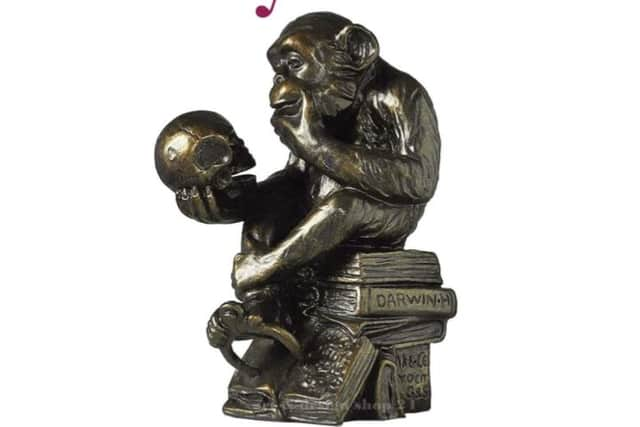It’s All Man-Made—An Exclusive Extract From New Book On Organised Religions
This article contains affiliate links. We may earn a small commission on items purchased through this article, but that does not affect our editorial judgement.


Newly published through Why Is It Publishing AB, Why Is It? We are Afraid of Being Descendants of Monkeys but Not Incest by Harry Margulies, provides a clear and comprehensive critique of organised religion, applying cold logic and critical thinking to reveal the incomprehensible and inconsistent nature of the world’s leading faiths.
In this exclusive extract from the book, Margulies—a leading proponent of atheism—asks how we can ever have free will when God’s holy texts are so vague and mysterious that we cannot know what He wants?
Now let us assume that a thousand years ago, a prophetess was told the following by one of the angels of God. The prophetess is taken to a secluded place and told that all three religions that claim Abraham as their ancestor are wrong and have been corrupted. She is told that God will take on a new name and wishes from now on to be called Xtraordinary. She is given only one command to observe and remember, and that is that, when worshipping Xtraordinary, the worshipper must stand on only one leg for at least 15 minutes at a time and for at least one hour per day while looking up to the sky and remembering God’s existence. For 20 years she keeps this to herself but then decides that she needs to tell some other people because she might soon pass to the other side. The prophetess tells nine people what the angel has told her, and they remember.
Eventually, it is decided that it is better to write it down because even these very few lines could be forgotten over time. To make sure that the prophetess’ angelic revelation – now more than twenty years old – isn’t corrupted, three people who have heard her instructions must agree on the wording and remember the same story for it to be approved in written form.
The story simply becomes that we should forget about all other rules and regulations in any of the Abrahamic religions and even God’s old names. Those texts have been corrupted over time and this is the last true prophetess with the only true version of what God wants from you. Nothing up until that point and nothing in the future will change that. Finally, it is written down that one should pray four times a day minimum, standing on one leg for at least 15 minutes at a time, while quietly looking at the sky. Praying on both legs would be at your own risk and could be subject to the penalty of death by lightning.
A couple of generations pass, and a new self-professed holy person decides that this very simple text needs further interpretation. It is not that you have no leg to stand on, but should it be the left or the right leg? Can you be allowed to decide, on your own, whether to use one leg or the other? In certain geographical areas, the conclusion is drawn that the left foot is the right one to stand on while praying in silence because that, for most of us, is the weaker leg and standing on our weaker leg shows submission to God. It is also in that geographical area decided that even left-handed or rather left-legged people would have to use only the left leg for praying, even though that would be their dominant leg. If they were to use the wrong leg for the area, others might be tempted to follow them and pray on the wrong leg.
As it happens, in another geographical area about 300 km to the east, a different approach is prescribed. There it is decreed that people should stand only on their right leg because that is the dominant leg and that will show Xtraordinary that we submit with all our strength.


After a further few generations, the different versions have become ingrained in the two areas. The children have been taught exactly how to do this, and nobody in either area has doubts about what is the right way. When it is discovered that not too far away there is a different interpretation of the correct leg to use, squabbling breaks out between the inhabitants of the two areas.
No doubt, in both places, someone must be tempted to try the other leg than the one prescribed for them. But they are so indoctrinated since childhood and everyone in the area has prayed on the same leg for generations that any other interpretation or practice has become blasphemous. And trying to stand on the other leg could cause to you be struck by lightning, as revealed by Xtraordinary himself.
Eventually, it is decided that a chief interpreter for each of the eastern and western sects of the religion has to be appointed. It has to be a woman, with the title the Ma-Pa, and she will have the ultimate say in what is right and wrong. The Ma-Pa is elected by the separate colleges of W–Elders, consisting of 26 women.
The need for Ma-Pas is a result of detailed discussions in the communities on such important matters as what to do if a person is too sick to stand on one leg. Could they, for instance, have a close relative hold them up? Could one lean against a wall? The eastern and western Ma-Pas come to somewhat different conclusions. But the rules become more and more intricate and more and more difficult to abide by.
Eventually and inevitably, a Protestorant movement comes about, the leader of which wants a much simpler version of all the religious rituals. She wants to go back to the original teachings of the original prophetess and decides that God, that is Xtraordinary, does not really mind and you can stand on whatever leg you want while praying.
What has this to do with free will? What we see is that our religion and how to worship and pray to God is entirely a matter of how we were educated and indoctrinated by our parents, and how they were indoctrinated by their parents, and in the end a matter of geography, of where the particular religion was interpreted in a particular fashion. The same original text has been given opposing interpretations over time, and, of course, the people on the other side must be using the wrong leg. Free will, in this context, would then mean that were you to be so naughty as to try to pray on the other leg than the one prescribed in your area, you would be risking death by lightning. We can easily imagine that the leaders of the two distinct ways of interpreting Xtraordinary’s will wanted to introduce some punishment on earth. Why wait for lightning to strike you when it is possible for Ma-Pa to impose the death penalty? Free will becomes a choice between following the rules and praying on the correct leg in your specific area or risking death. In the other geographical area, praying on what is the right leg in your area would have the same dire consequences."
Why Is It? We are Afraid of Being Descendants of Monkeys but Not Incest by Harry Margulies is published through Why Is It Publishing AB and is out now in hardcover, paperback, and eBook formats, priced £19.95, £12.95, and £9.99 respectively. It is available online from Amazon and all good book stores. For more information, visit www.whyisitpublishing.com. Follow author Harry Margulies via Twitter or Instagram at @askwhyisit.
Q&A INTERVIEW WITH AUTHOR HARRY MARGULIES
Author Harry Margulies, 73, is a second-generation Holocaust survivor who was raised in the Jewish faith. However, he became unsatisfied with religious doctrine in his teenage years and this would ultimately lead him to embracing atheism. His controversial new book, Why Is It? We are Afraid of Being Descendants of Monkeys but Not Incest, is the culmination of 20 years of dedicated research and a lifetime of religious questioning.
We speak with him to learn more about why he felt it important to challenge organised religion, how logic and reasoning can expose troubling flaws in religious thought, and why he hopes the book will, in particular, be read by those with religious inclinations, among many other things.


Q: You have written a very controversial book on religion. Why?
A: First, I understand the pain on the journey from belief to reason and also how liberating it is.
Second, I'm pointing to facts. What I talk about is written in the holy texts. The real controversy is that my book is considered controversial. It comes from apologetics, who maintain the art of trying to explain away what in the holy texts cannot be explained.
Q: Are you not afraid that your book,Why Is It? We Are Afraid of Being Descendants of Monkeys But not Incest, will be seen as atheist propaganda?
A. Only by those who prefer to have the field of indoctrination and propaganda in the name of God and church to themselves.
Q: You were brought up in the Jewish faith. What led you to abandoning this and embracing atheism?
A: It was a process that started at theage of 14 when I came to realise that if there is a God, he can’t really be interested in what I eat and from what plates and with which cutlery. This led me to read a lot of books including the Bible itself. I was unsatisfied with the writings of this supposed God and felt that the doctrines proposed in religion no longer suited me.
Q: In a nutshell, what has led you to conclude that there is no such thing as God?
A: Atthe age of 14, I went to a hot-dog stand and ate 10 non-kosher hot dogs challenging God to smite me. God did not react.
Q: Faith provides reassurance for many people. Why would you say it is better to abandon such religious beliefs if they are false rather than keep to a ‘beautiful lie’?
A: Because the powerthat faith gives to religious organisations has an outsized influence on our society. Requiring an imaginary supervisor for you to be a moral person makes you an inherently bad person. Why waste our time in a ‘beautiful lie’ when we could change the perspective to have faith in ourselves.
I offer one example. When a believer refuses life-saving blood transfusion believing God forbids it, it derives directly from religious reassurance.
Q: You are a staunch advocate of logical analysis. What is the main logical tool you have employed in your analysis of organised religions and their holy books, and why is this so powerful?
A: Occam’s Razor is my tool. It is so simple: it tells you that the most simple answer to a given question is almost always right. God needs a lot ofhypotheses just to explain away the gaps and inconsistencies. The use of Occam’s razor forces the reader into logical thinking rather than allowing oneself to be subjected to the ‘fuzzy feeling’ of childhood indoctrination.
Once you are able to look away from what you have been taught, what holy texts ‘mean’ and read them for what they actually say, you will also be able to interpret any other texts, including legal texts, with even more clarity.
Q: Can you give an example within one of the three Abrahamic faiths of logical inconsistency?
A: Right at the beginning, there are two inconsistent and impossible creation stories. In the first, Adam and Eve were created together on day one. In the second, Adam was created first and all-seeing God didn’t know he was going to need a companion. To God’s surprise, Adam needed a companion. God decides, “Ah, better give him a companion;not good for him to be alone”. He doesn’t just create Eve the way he did with Adam, but instead needs to sedate him and remove one of his ribs. One wonders, since God is so surprised that he needed to create the companion, if Adam was already appropriately equipped for Eve’s arrival and procreation, or did God add any necessary physical tool while Adam was sedated?
Q: What is your view on the impact of religion on the young?
A: You are purposefully indoctrinating young peopleinto a belief system where the ‘loving God’ is also a supervisor to fear. A lot of psychological damage can be the result. If you are taught that prayer will solve your problems, you may not act appropriately throughout your life time.
If you’re indoctrinated to believe that the next life is so much better, you might give up too easily on this life.
Q: In brief, what hasyour analysis of religious texts led you to conclude?
A: That if God could not inspire or write clearer texts, He must’ve done this deliberately so that we would fight over the interpretation of holy books for His own amusement… hard to believe so I am certain he doesn’t exist.
Q: Who are you aiming your book at, and how do you think it will most benefit readers?
A: My primary target are the fence-sitters: those who are unsure where they stand on the religious spectrum.My analysis and open questions are intended to lead them to an Occam’s razor answer. The religious that have already had a chance to read my book find it very challenging and non-believers have found it most informative.
Q: Organised religions have been deeply embedded within the fabric of society for millennia. Do you think society can continue to function without them?
A: Not only do I think society can continue to function without them, I believe it would thrive. Do I think it’ll ever happen? No, because religious institutions benefit far too much from the current way.
Going to a church to sprinkle some water on a baby’s head as a means to rid the baby of original sin obviously makes the religious organisation relevant and has really nothing to do with God. Removing the power and relevance of religious institutions would likely ensure a more logical society.
Q: Religion is widely credited with making humanity moral, and that without it we would potentially descend into brutality. What is your perspective?
A: Crusades, inquisition, colonization, (dis)honour killings, forceful conversion, genital mutilation, burning ‘witches;at the stake, The Thirty Years Wars, Northern Ireland, Shia vs. Sunni, and violent interpretations derived from the ‘perfect book’, the Quran.
Tell me again how one can legitimately argue that religious deserves credit for making humanity moral and without violence?